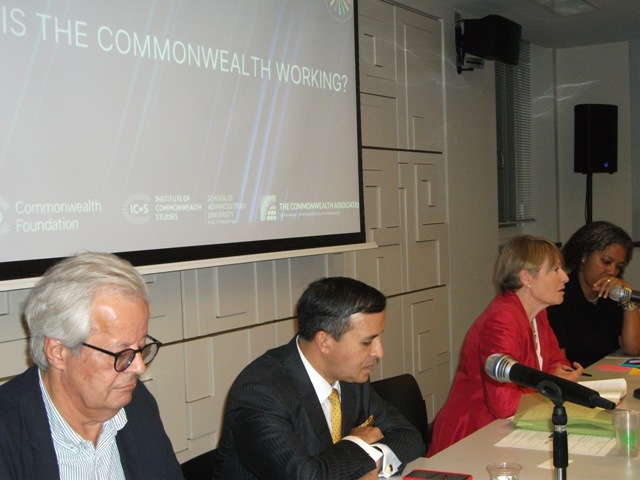 Final session panel: (l-r) Nicholas Watts, Luis Franceschi, Sue Onslow and Mischa Manderson-Mills.
Final session panel: (l-r) Nicholas Watts, Luis Franceschi, Sue Onslow and Mischa Manderson-Mills.
The twice-postponed Kigali Commonwealth summit is now due to take place in the week beginning 20 June 2022. The leaders’ debate is likely to be lively. Can the significant decline in resources be reversed and new relevance and impact be restored to the Commonwealth’s programmes? With a hotly-contested election for the post of Secretary-General under way, a controversial Chair-in-Office, and Prince Charles assuming a greater role in representing the Head, will the Commonwealth have the leadership necessary for future challenges? With recurrent questions about Rwanda’s commitment to human rights and controversy about how Commonwealth nations should treat refugees and migrants, is the association doing enough to maintain its values? And can the Commonwealth’s networks sustain it as a relevant soft power organisation for the twenty-first century, given the current turbulence in international relations following Russia’s invasion of Ukraine?
Is the Commonwealth working? This was the theme of a pre-CHOGM [Commonwealth Heads of Government Meeting] discussion held on 27 May at the Institute of Commonwealth Studies, University of London.
This event, which included in-person and virtual panellists and audiences, was organised by The Round Table: The Commonwealth Journal of International Affairs and the Institute of Commonwealth Studies, in partnership with the Commonwealth Foundation and the Commonwealth Association.
SESSION 4: Programmes
The Director of the Institute of Commonwealth Studies, Sue Onslow, chaired the final session of the day. Her panel consisted of the Commonwealth Secretariat’s Senior Director of the Governance and Peace Directorate, Professor Luis Franceschi, who will be the Conference Secretary of the June CHOGM in Kigali, former media consultant at the Commonwealth Secretariat, Mischa Manderson-Mills, and Senior Research Fellow at the Institute of Commonwealth Studies, Nicholas Watts.
Chair Dr Onslow kicked off the session by pointing out that, whilst in the past, the Commonwealth contributed significantly on a range of issues and programmes, the Secretariat’s capacity and financial resources have been significantly reduced: “Is the Commonwealth working and, if not, why not?”
Prof Franceschi said that the theme of the conference was a question he asked himself every day. “And I say ‘yes’ but we can do better,” he said. He added that “the Commonwealth is working … but we are not very good at promoting ourselves”. He outlined behind-the-scenes successes in Zambia and Guyana, election observation work, the importance of background toolkits, and ongoing programmes and projects. “Sometimes, these things go unnoticed and cannot be said publicly,” he added. He outlined some areas where the Commonwealth could do more or better but underlined the budget restraints the Secretariat faced.
Dr Watts spoke about the need for a matrix to measure how the Commonwealth is working and the role of its various networks. He argued for greater engagement, communication and cooperation between the Secretariat and civil society organisations. The Independent Forum of Commonwealth Organisations had been working to give Commonwealth organisations a collective voice, but it was still very much an uphill struggle to be heard.
Mischa Manderson-Mills spoke of the Commonwealth’s “communications problem” and the need to get through to young people. “Is the Commonwealth getting its message across? I think the answer is ‘no,”, she said. She referenced how difficult it was to find even basic and foundational documents on the Secretariat’s website, and the lack of engaging material. If the Commonwealth Secretariat had success stories, it was very bad at making them known.
The Q&A session looked transparency and accountability, monitoring and oversight of programmes, cooperation and complementarity. Comments included the need and means to make the Commonwealth less London-centric; and the ongoing discussion with the CHOGM 2022 organisers in Rwanda to open up sessions virtually beyond Kigali.
View the session on Programmes:
[Filming and video by David Aitken-Smith and Melissa Aitken-Smith.
Text and photos by Debbie Ransome.]
View the opening and session one on Networks
View session two on Leadership
View session three on Values
Related articles:
Rwanda and CHOGM 2020 – Round Table Journal
CHOGM diary 2010 – Round Table Journal
CHOGM diary Sri Lanka – Round Table Journal 2014
CHOGM 2008: Notes from a CHOGM novice – Round Table Journal



